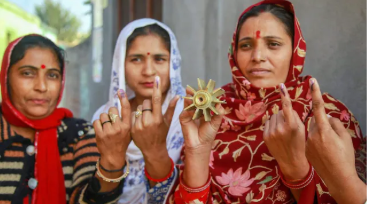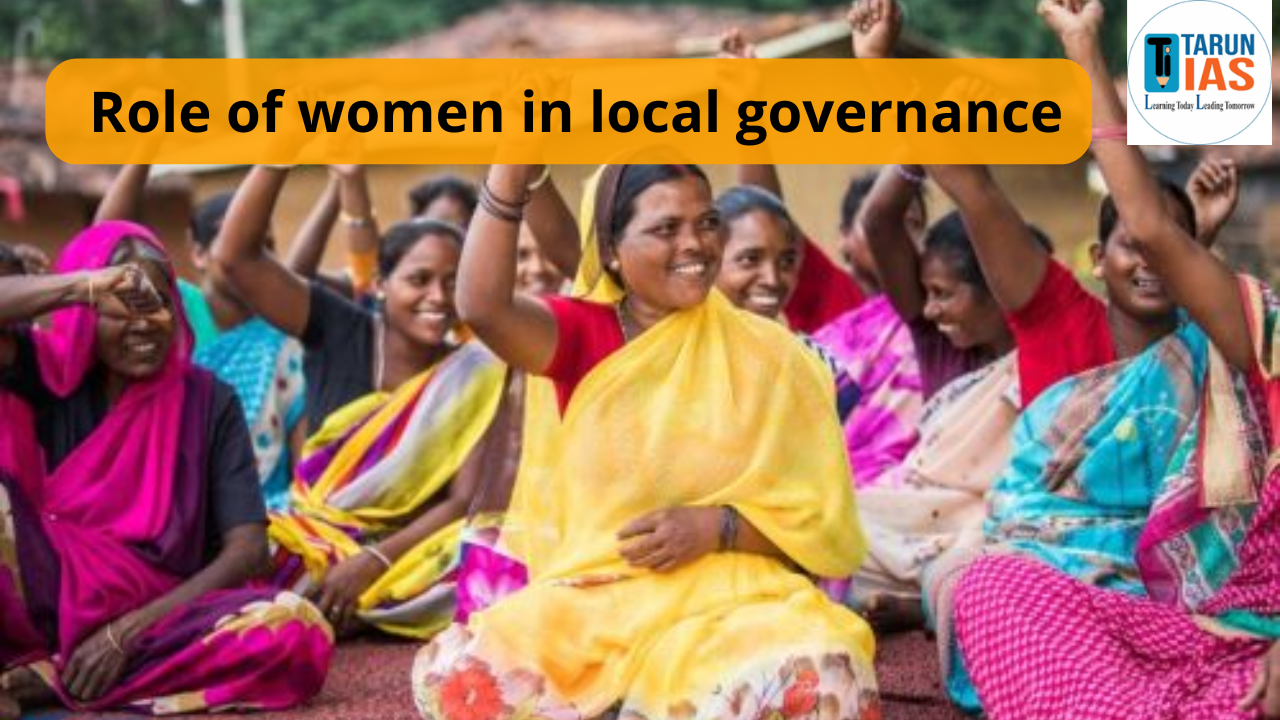Role of Women in Local Governance Introduction
- The 73rd Constitutional Amendment Act of 1992 was a milestone in India’s democratic framework, introducing Panchayati Raj Institutions (PRIs) and mandating women’s participation through a 33% reservation in local governance.
- Many states have since raised this to 50%, significantly increasing women’s representation in Gram Panchayats, Block Samitis, and Zilla Parishads.
- However, despite this legal empowerment, the practice of “Pradhan Pati” (Proxy Sarpanch) remains a major challenge, where male relatives—husbands, fathers, or brothers—exercise power on behalf of elected female representatives. This practice undermines women’s political autonomy and weakens grassroots democracy.

Current Status of Women in Local Governance
- Women’s participation in PRIs has seen remarkable growth. As of 2023, over 1.45 million elected women representatives (EWRs) serve in India’s 2.5 lakh Panchayats, constituting over 46% of all elected members. States like Bihar, Madhya Pradesh, Chhattisgarh, Rajasthan, Odisha, Maharashtra, and Kerala have implemented 50% reservation, further strengthening female representation.
- The Global Gender Gap Report 2023 highlighted the importance of women’s participation in local governance. It noted that only 18 out of 146 countries have achieved more than 40% representation of women in local governance. India stands among the top countries, with over 44% participation of elected women representatives in PRIs, demonstrating significant progress.
Significance of Ending Proxy Leadership in PRIs
- Gender Empowerment: Ensuring that women sarpanches exercise real authority aligns with the vision of reservation policies and strengthens grassroots democracy. For instance, in 2025, Rekha Gupta was appointed as the Chief Minister of New Delhi, marking the fourth time a woman has held this position in the capital. Her leadership underscores the increasing acceptance and effectiveness of women in significant governmental roles.
- Inclusive Development: Women leaders often prioritize social issues, including education, healthcare, and infrastructure, benefiting marginalized communities. A notable example is the village of Pachgaon in Maharashtra. In 2024, under the leadership of a woman-led council, the village transformed its economy by leveraging traditional forest rights, leading to improved livelihoods and infrastructure.
- Democratic Integrity: Genuine female leadership strengthens public trust and promotes participatory governance. The case of Thennamadevi village in Tamil Nadu is illustrative, where, between 2016 and 2018, a group of teenage girls took charge, implementing civic improvements and enhancing community engagement.
- Economic Growth: Women’s active role in governance contributes to inclusive economic policies and rural development. Studies have shown that increasing women’s participation in the workforce and leadership positions can significantly boost India’s GDP. For instance, McKinsey Global Institute estimates that advancing women’s equality could add $0.3 trillion to India’s GDP by 2025. The Economic Survey 2023-24 emphasized women-led development as a key driver of economic resilience, underscoring the need for greater female participation in governance.
- Policy Prioritization for Women & Children: Studies indicate that women-led Panchayats focus on maternal health, school infrastructure, and nutrition programs more effectively than male-led ones. For example, Ritu Jaiswal, the former Mukhiya of Singhwahini Gram Panchayat in Bihar, initiated significant improvements in local healthcare and education during her tenure, earning national recognition for her efforts.
- Accountability & Transparency: According to the Institute of Rural Management Anand (IRMA), Panchayats with strong female leadership demonstrate lower corruption levels and better utilization of government funds. The proactive governance of leaders like Sudha Patel, India’s youngest elected blind female sarpanch, has led to infrastructural development and enhanced public services in their communities.
- Economic Survey & Budget 2023-24 Emphasis: The Economic Survey 2023-24 highlighted women-led development as a key driver of economic resilience, emphasizing the need for greater female participation in governance. In line with this, political parties have been wooing women voters with cash handouts amid economic woes, recognizing their crucial role in the economy.
Successful Examples of Women Leadership in PRIs
|
Challenges in Eliminating Proxy Leadership
- Patriarchal Mindset – Women are often treated as nominal leaders, with decision-making controlled by male relatives. In Bihar, the term ‘Mukhiya Pati’ refers to husbands of female village heads who exercise authority on behalf of their wives. This practice of proxy leadership dilutes the empowerment intended by reserving seats for women in local governance.
- Low Literacy & Awareness – Many women representatives lack formal education and political training, affecting their ability to make independent decisions.
- Male Domination in Decision-Making – Even in reserved seats, male influence often dictates governance policies.
- Lack of Political Will – Weak enforcement mechanisms allow proxy leadership to persist.
- Limited Digital & Financial Independence – Many women sarpanches lack access to smartphones, official transport, and assistants, restricting their autonomy.
- Bureaucratic Challenges – Complex documentation processes and low digital literacy hinder effective governance participation.
- Gender-Based Violence & Intimidation – Women leaders often face threats or coercion from local power groups. Reports from Bihar, Rajasthan, and Uttar Pradesh indicate cases where female sarpanches were pressured to resign.
- Low Remuneration – Insufficient honorarium (e.g., ₹4,500/month in Rajasthan) discourages serious participation.
- Misuse of Whistleblowing Mechanisms – In some cases, false accusations are used as a tool to discredit women leaders.
Government and Institutional Efforts to Boost Women’s Participation in PRIs
- Capacity Building Programs – The Ministry of Panchayati Raj provides training under the Rashtriya Gram Swaraj Abhiyan (RGSA) to enhance governance skills.
- Sashakt Panchayat-Netri Abhiyan: A training initiative for women elected representatives.
- States are encouraged to hold separate Mahila Sabhas and Ward Sabhas to amplify women’s voices in governance.
- Digital Literacy Initiatives – Digital India and e-Panchayat programs equip women leaders with technological tools to streamline administration.
- NGO Interventions – Organizations like PRIA (Participatory Research in Asia) and UN Women provide mentorship and training for female leaders.
- Constitutional Provisions – The 73rd Amendment ensures women’s reservation in PRIs, with many states extending it to 50%.
- Committee on Proxy Representation (2023) – The Ministry of Panchayati Raj formed a committee in 2023 to examine cases of proxy leadership and recommend reforms.
- Exemplary Penalties: Suggested monetary and legal actions against proxy leadership.
- Multi-Pronged Strategy: Includes policy reforms, peer support, and technological monitoring.
- Gender-Exclusive Quotas & Public Swearing-In: Inspired by Kerala’s model, the committee proposed gender-exclusive subject committees and public oaths for women sarpanches.
- State-Level Innovations – Kerala and Rajasthan have introduced gender-sensitive policies and support mechanisms for women in PRIs. Rajasthan was one of the early states to mandate 50% reservation for women in PRIs, significantly increasing their participation. Rajasthan mandates separate Mahila Gram Sabhas (Women’s Village Assemblies) to allow women to raise their concerns without male interference.
Way Forward: Strengthening Women’s Leadership in PRIs
- Capacity Building & Education:
- Expand digital literacy and governance training for women representatives.
- Implement gender sensitization programs to challenge patriarchal norms.
- Introduce minimum educational qualifications (e.g., 12th grade) for sarpanches to ensure informed governance.
- Financial & Administrative Empowerment:
- Direct fund transfers to female leaders to enhance financial autonomy.
- Simplify paperwork and administrative processes to ensure ease of governance.
- Political & Community Support:
- Experienced women leaders should mentor newly elected representatives.
- Strengthen Self-Help Groups (SHGs) and Mahila Panchayats to provide grassroots support.
- Legal & Institutional Reforms:
- Strengthen enforcement of the 73rd Amendment with stricter monitoring.
- Introduce legal penalties for proxy leadership cases.
- Establish Women’s Help Desks at Block & District levels.
- Recognize efforts against proxy leadership through awards like “Anti-Pradhan Pati Champions.”















